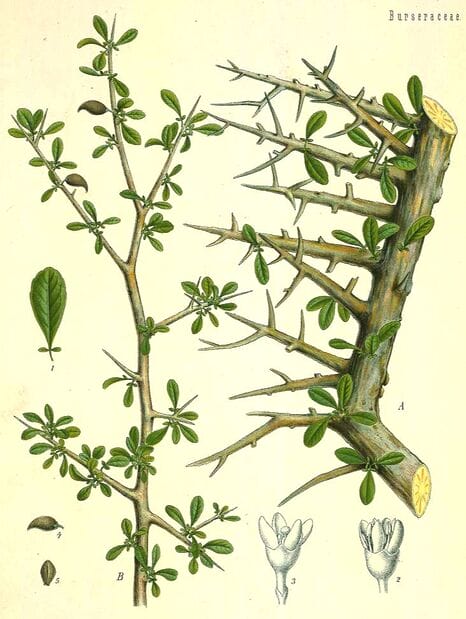Stacte, Liquid Myrrh |

|
 Commiphora myrrha
Commiphora myrrha Köhler, F.E., Köhler’s Medizinal Pflanzen (1890)
Botanical name:
Commiphora myrrha
Parts used:
Liquid oily gum-resin
Two types were differentiated:
- Native: spontaneous liquid exudation of the Myrrh tree in an oily state
- Factitious: oil extracted from fresh Myrrh by mixing with a little water and pressing (Dioscorides)
Temperature & Taste:
Warm, dry. Pungent, Bitter
Classification:
Uses:
1. Moves the Blood, Resolves Stasis:
-hardness, including that of the Liver or Spleen
2. Regulates Qi, Stops Wind:
-Paralysis, Spasms
3. Benefits the Stomach
-Stomach weakness, debility, nausea
4. Stops Cough, Free the Breath:
-Cough, Asthma, difficulty Breathing
5. Externally:
-paralysis, wounds of the nerves
-Abscesses
Dose:
Mostly used externally
250mg–500mg internally
Substitute:
1. Essential oil of Myrrh
2. “Comparable to Myrrh” (Dioscorides)
3. Storax
Comment:
1. Stacte was often mentioned by the Ancients but was far less common in later times. It was also far more valuable than Myrrh which also commanded high prices in ancient times.
2. It was an important ingredient in the ancient Solomon’s Temple Incense used by the Jews.
Main Combinations:
1. Cough with Fever, Stacte, Hyssop, Orris, Maidenhair, Aniseed, Licorice (Syrian ‘Book of Medicine‘, Budge, 1913)
2. Cough, Difficulty breathing, Asthma, Stacte, Pine nuts, Almonds, Terebinth gum, Pepper, Thyme, Calamint (Syrian ‘Book of Medicine‘, Budge, 1913)
3. Cough up Blood, Stacte, Henbane seed, Frankincense, Storax, Cypress nut, Amber, Germander; form pills. (Syrian ‘Book of Medicine‘, Budge, 1913)
4. ‘Evil condition of the Stomach’, for Edema, and ‘dropping (prolapse?) of the belly, Stacte, Orris, Pepper, Ginger, Aniseed, Dill seed, Asafetida, Ammi, Parsley seed, with Honey form an Electuary. (Syrian ‘Book of Medicine‘, Budge, 1913)
5. Sluggish and weak Stomach, Hardness of the Liver and Spleen, prepare a wine with Wormwood, Stacte, Fennel Rose, Aloe, Agaric, Mastic, Costus, Saffron (Syrian ‘Book of Medicine‘, Budge, 1913)
6. Stomach weakness with Wind and Indigestion, Ginger, Parsley seed, Spikenard, Aniseed, Pepper, Calamint, Cumin, Cinnamon, with Honey form an Electuary (Syrian ‘Book of Medicine‘, Budge, 1913)
7. Severe Nausea, Sweet and Sour Pomegranate juices are boiled with Mint and Honey, with powder of Aniseed and Stacte (liquid Myrrh) added. (Syrian ‘Book of Medicine‘, Budge, 1913)
8. Burning Stomach pain, twisting of the Bowels or Violent Hiccups, Stacte with Costus, Spikenard, Cassia, Rose, Saffron, Asarum, Aloes, Opium, mixed with Psyllium mucilage and formed into pills (Syrian ‘Book of Medicine‘, Budge, 1913)
9. Abdominal pain, Psyllium mucilage with Stacte, Orris, Coral, Amber, Saffron, made into pills and given before bed. (Syrian ‘Book of Medicine‘, Budge, 1913)
10. Jaundice from Obstruction, Stacte with Aloe, Polypody, Dodder, Safflower, Spikenard
11. Paralysis, Stacte with Oil of Balsam, Oil of Spikenard and Wax, used as an ungent. (Syrian ‘Book of Medicine‘, Budge, 1913)
12. Wounds of the nerves and for all kinds of Abscess, Stacte, Terebinth gum, Cedar gum, Euphorbium, made into an ointment with wax and oil. (Syrian ‘Book of Medicine‘, Budge, 1913)
Major Formulas:
Cautions:
Avoid during Pregnancy.
